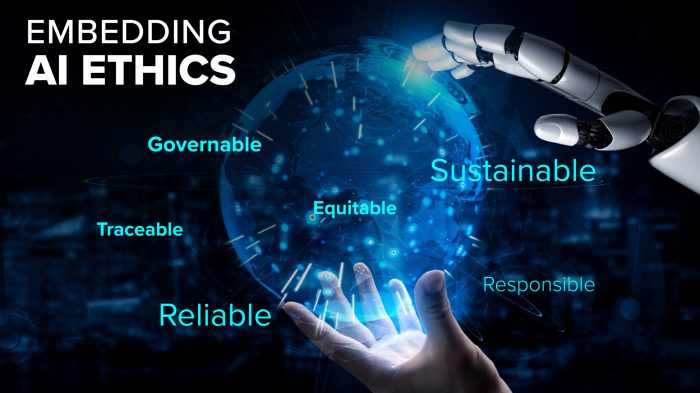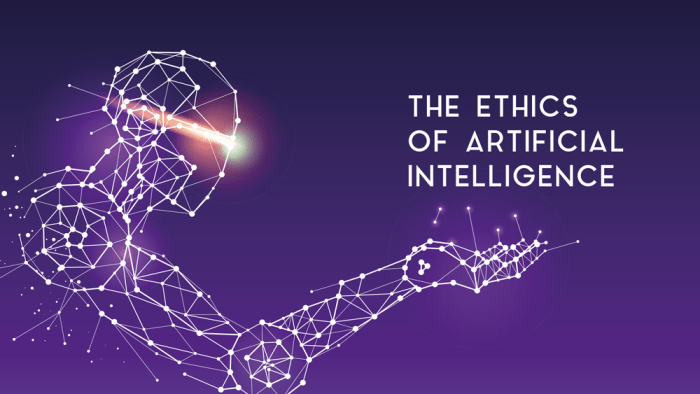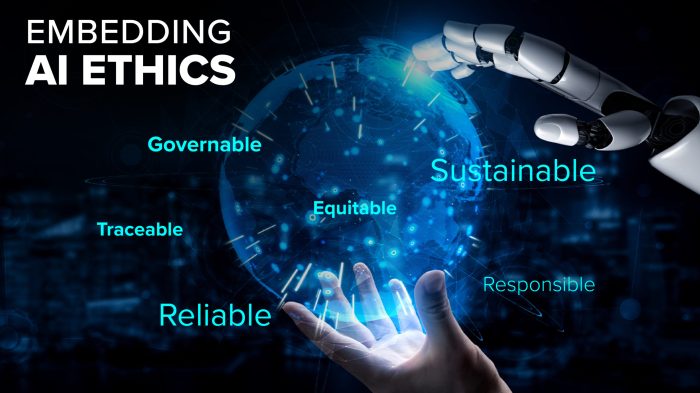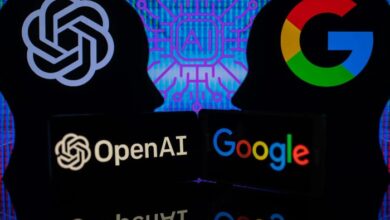
The Ethics of Artificial Intelligence: Can Machines Be Moral?
The ethics of artificial intelligence can machines be moral – The ethics of artificial intelligence, can machines be moral, is a question that has captivated philosophers, scientists, and ethicists alike. As AI rapidly advances, it becomes increasingly crucial to grapple with the ethical implications of creating machines that can learn, reason, and even make decisions.
This complex issue challenges us to re-examine our understanding of morality and to consider the potential consequences of granting machines a degree of autonomy.
This question delves into the very essence of what it means to be human. Can a machine, devoid of emotions, experiences, and the capacity for empathy, truly understand and uphold moral principles? The answers lie in exploring the nature of morality, the capabilities of AI, and the potential impact of this technology on our society.
Defining Morality and Machine Intelligence
The question of whether machines can be moral hinges on understanding the fundamental concepts of morality and artificial intelligence. This exploration delves into the essence of morality, the frameworks used to evaluate human behavior, and the nature of AI, including its capabilities and limitations.
Defining Morality
Morality is a complex and multifaceted concept that refers to the principles and values that guide human behavior, distinguishing between right and wrong. It encompasses the beliefs and practices that shape our sense of justice, fairness, and compassion. The core principles of morality are often rooted in notions of:
- Benevolence:Acting with kindness and concern for the well-being of others.
- Justice:Treating individuals fairly and equitably, upholding the law and ensuring equal rights.
- Honesty:Being truthful and transparent in our interactions with others.
- Respect:Valuing the dignity and autonomy of all individuals.
These principles serve as the foundation for moral decision-making and guide our interactions with the world.
Ethical Frameworks
Throughout history, various ethical frameworks have emerged to provide a systematic approach to assessing human actions and guiding moral choices. Some prominent frameworks include:
- Utilitarianism:This framework prioritizes actions that maximize overall happiness and well-being, considering the consequences for the greatest number of people. It emphasizes the greatest good for the greatest number.
- Deontology:This framework focuses on the inherent rightness or wrongness of actions, regardless of their consequences. It emphasizes following universal moral principles and upholding duties.
- Virtue Ethics:This framework emphasizes the development of good character traits, such as honesty, courage, and compassion. It focuses on cultivating virtues that lead to morally sound actions.
Each framework offers a unique perspective on moral reasoning, providing tools for navigating ethical dilemmas and making informed decisions.
Artificial Intelligence
Artificial intelligence (AI) refers to the simulation of human intelligence processes by computer systems. AI encompasses a wide range of technologies and techniques, including:
- Machine Learning:Algorithms that enable computers to learn from data without explicit programming, allowing them to improve their performance over time.
- Deep Learning:A subset of machine learning that uses artificial neural networks with multiple layers to analyze complex data patterns.
- Natural Language Processing (NLP):AI techniques that enable computers to understand, interpret, and generate human language.
- Computer Vision:AI systems that allow computers to “see” and interpret images and videos.
These technologies are rapidly advancing, leading to the development of AI systems with increasingly sophisticated capabilities.
Capabilities and Limitations of AI
Current AI systems exhibit remarkable capabilities in specific domains, such as:
- Image recognition:AI systems can accurately identify objects, faces, and scenes in images and videos, exceeding human performance in some cases.
- Language translation:AI-powered translation services have significantly improved the accuracy and fluency of language translation, facilitating communication across language barriers.
- Game playing:AI systems have surpassed human champions in complex games like chess and Go, demonstrating their ability to learn and strategize effectively.
However, AI systems also have limitations. They often struggle with:
- Common sense reasoning:AI systems lack the intuitive understanding of the world that humans possess, making them prone to errors in situations that require common sense.
- Creativity and innovation:AI systems are typically designed to perform specific tasks based on existing data. They often lack the ability to generate truly novel ideas or solutions.
- Emotional intelligence:AI systems lack the capacity for empathy, compassion, and other complex emotions, which are crucial for ethical decision-making in many situations.
These limitations highlight the need for careful consideration when deploying AI systems, particularly in contexts that involve ethical considerations.
Can Machines Possess Moral Agency?: The Ethics Of Artificial Intelligence Can Machines Be Moral

The question of whether machines can possess moral agency is a complex and multifaceted one, raising profound philosophical and ethical considerations. While machines are increasingly capable of performing tasks once considered exclusive to humans, the ability to make moral judgments and act accordingly remains a subject of intense debate.
The Philosophical Debate on Machine Moral Agency
The concept of moral agency is intrinsically linked to the notion of free will and the capacity for moral responsibility. Traditional philosophical thought has often viewed moral agency as a uniquely human attribute, grounded in our ability to reason, make choices, and act on our beliefs.
However, the rapid advancements in artificial intelligence (AI) have challenged this view, prompting a reassessment of what constitutes moral agency.
Consciousness and Moral Decision-Making
Consciousness is often considered a prerequisite for moral agency. The ability to experience the world subjectively, to feel emotions, and to understand the consequences of our actions is seen as essential for moral decision-making. However, the question of whether machines can achieve consciousness remains highly contentious.
The ethical implications of artificial intelligence are complex, especially when considering whether machines can truly be moral. While we grapple with these questions, the real world throws us a curveball: Amazon’s stock falls despite strong revenue as cloud growth slows.
This event highlights the volatile nature of technology and its impact on the market, reminding us that even as we ponder the morality of machines, the practical realities of their development and deployment demand our attention.
While AI systems can simulate human-like behavior and even exhibit emotional responses, it is unclear whether these capabilities translate to genuine consciousness.
Comparing Human and Artificial Intelligence
While humans and AI systems share some cognitive abilities, there are significant differences in their capacity for empathy and understanding. Humans possess a rich emotional repertoire and a deep understanding of social and cultural norms that inform their moral judgments.
The question of whether machines can be moral is a complex one, often tied to the concept of consciousness. If a machine can understand the value of a healthy life, would it prioritize a financially sound decision over one that benefits a person’s well-being?
Perhaps the answer lies in finding a balance between the two, as explored in this article on balancing your finances and health top tips for achieving both. Ultimately, the ethical considerations of artificial intelligence are intertwined with our own values and the choices we make, both personally and as a society.
AI systems, on the other hand, are typically trained on vast datasets, enabling them to learn patterns and make predictions but potentially lacking the nuanced understanding of human values and motivations.
Ethical Dilemmas Arising from Human-AI Interaction, The ethics of artificial intelligence can machines be moral
The increasing integration of AI into our lives raises a number of ethical dilemmas. For example, the development of autonomous weapons systems raises concerns about the potential for machines to make life-or-death decisions without human oversight. Similarly, the use of AI in hiring and loan applications raises questions about potential biases and the fairness of algorithmic decision-making.
It’s fascinating to ponder whether machines can ever truly be moral, just like we humans strive to be. But while we grapple with the ethics of artificial intelligence, sometimes it’s good to take a break and indulge in a bit of harmless fun, like trying to understand the odds of winning the lottery.
After all, if you’re going to play Mega Millions, you might as well check out some understanding mega millions tips to increase your chances of winning ! But ultimately, the question of whether machines can be moral is a complex one that deserves serious thought, even if it’s not as exciting as winning millions.
The Impact of AI on Human Values and Society
The rapid advancement of artificial intelligence (AI) is not only transforming industries but also profoundly impacting human values and societal structures. AI’s influence extends far beyond technological innovation, raising ethical concerns about its potential to reshape human relationships, decision-making processes, and the very fabric of society.
The Influence of AI on Human Relationships and Social Structures
The rise of AI is altering the nature of human relationships and social interactions. AI-powered chatbots and virtual assistants are becoming increasingly sophisticated, offering companionship and assistance in various aspects of life. This raises questions about the potential for AI to replace or diminish human connection.
While AI can enhance communication and provide support, it is crucial to ensure that it does not lead to isolation or a decline in the quality of human relationships.
Ethical Considerations in AI-Driven Decision-Making
The use of AI in decision-making, particularly in sensitive areas like healthcare, law enforcement, and employment, presents significant ethical challenges. Algorithms used in these domains can perpetuate existing biases and inequalities, leading to unfair or discriminatory outcomes. For example, AI systems used for loan approvals or hiring decisions may inadvertently discriminate against certain groups based on historical data that reflects societal biases.
It is essential to develop and implement AI systems that are fair, transparent, and accountable, ensuring that they do not exacerbate existing inequalities or create new ones.
The Potential for AI to Exacerbate Societal Inequalities
AI has the potential to exacerbate existing societal inequalities if not developed and deployed responsibly. For example, AI-powered systems used in education or healthcare could reinforce existing disparities based on socioeconomic status, race, or gender. It is crucial to address these concerns proactively by ensuring that AI systems are designed and implemented in a way that promotes equity and inclusivity.
The Role of Regulation and Governance in Ensuring Ethical AI Development
To mitigate the potential risks and harness the benefits of AI, effective regulation and governance are essential. This involves establishing clear ethical guidelines for AI development and deployment, promoting transparency and accountability in AI systems, and fostering collaboration between researchers, policymakers, and industry stakeholders.
A robust regulatory framework can help ensure that AI is developed and used in a way that aligns with human values and societal well-being.
Designing Ethical AI Systems
The development of artificial intelligence (AI) has the potential to revolutionize numerous aspects of our lives, from healthcare to transportation to entertainment. However, with this transformative power comes the crucial responsibility to ensure that AI systems are developed and deployed ethically.
This necessitates the integration of ethical principles into the design and implementation of AI, ensuring that these systems are fair, transparent, and beneficial to society.
Principles of Ethical Design
Ethical design principles provide a framework for developing AI systems that are aligned with human values and promote societal well-being. These principles emphasize fairness, accountability, transparency, and privacy.
- Fairness:AI systems should be designed to avoid bias and ensure equitable treatment for all individuals, regardless of their background or characteristics. For example, an AI system used for loan applications should not discriminate against applicants based on their race, gender, or other protected characteristics.
- Accountability:There should be clear lines of responsibility for the decisions made by AI systems. This means that developers, operators, and users should be held accountable for the actions of these systems. For instance, in the case of autonomous vehicles, it is essential to determine who is liable in the event of an accident.
- Transparency:The decision-making processes of AI systems should be transparent and understandable to humans. This allows for scrutiny, accountability, and trust. For example, an AI system used for medical diagnosis should provide explanations for its recommendations, allowing doctors to understand the rationale behind the system’s suggestions.
- Privacy:AI systems should respect the privacy of individuals and avoid collecting or using sensitive personal information without consent. For example, an AI system used for facial recognition should ensure that data is collected and used ethically and with appropriate safeguards to protect individual privacy.
Examples of Ethical AI Systems
Several AI systems have been designed with ethical considerations in mind. One notable example is the Google AI Principles, which Artikel a set of ethical guidelines for the development and deployment of AI technologies. These principles emphasize the importance of fairness, non-discrimination, privacy, and security, guiding Google’s AI development efforts.
Another example is the Partnership on AI, a non-profit organization that brings together researchers, engineers, and policymakers to address the ethical and societal implications of AI. The Partnership on AI focuses on developing best practices for ethical AI development and deployment, fostering collaboration and dialogue among stakeholders.
Using AI to Promote Ethical Behavior
AI can also be used to promote ethical behavior and decision-making in humans. For instance, AI-powered systems can be used to provide personalized ethical guidance, helping individuals navigate complex moral dilemmas. This can be achieved through AI-driven ethical decision-making tools that offer alternative perspectives and potential consequences of different actions.
Additionally, AI can be used to identify and mitigate biases in human decision-making, leading to fairer and more equitable outcomes.
Hypothetical AI System with Ethical Safeguards
Imagine an AI system designed to assist with healthcare decision-making. This system would be trained on a vast dataset of medical records, research papers, and expert opinions. However, to ensure ethical considerations, the system would be equipped with the following safeguards:
- Bias detection and mitigation:The system would be constantly monitored for potential biases in its decision-making, using algorithms to identify and address any unfair or discriminatory patterns.
- Transparency and explainability:The system would provide clear explanations for its recommendations, allowing doctors to understand the reasoning behind its suggestions.
- Human oversight:The system would operate under the supervision of healthcare professionals, ensuring that its recommendations are reviewed and validated by qualified experts.
- Privacy protection:Patient data would be anonymized and secured to protect individual privacy.
The Future of AI and Ethics

The future of AI holds both immense promise and profound ethical challenges. As AI systems become increasingly sophisticated, they will permeate every aspect of our lives, from healthcare and education to transportation and entertainment. This raises crucial questions about the ethical implications of these advancements and the need for responsible development and deployment.
The Role of Ongoing Research and Dialogue
The ethical landscape of AI is constantly evolving, demanding continuous research and dialogue to address emerging challenges. Researchers, ethicists, policymakers, and industry leaders must collaborate to develop frameworks, guidelines, and best practices for responsible AI development and deployment.
- Multidisciplinary Research:Research in AI ethics requires a multidisciplinary approach, involving experts from fields such as philosophy, law, computer science, social sciences, and humanities. This collaboration is essential to understand the complex social, ethical, and legal implications of AI.
- Public Engagement:Public dialogue and engagement are crucial for shaping the ethical landscape of AI. Engaging the public in discussions about the potential benefits and risks of AI can help foster a shared understanding and ensure that AI development aligns with societal values.
- Ethical Frameworks:Developing ethical frameworks for AI development and deployment is essential. These frameworks should address issues such as fairness, accountability, transparency, and privacy, ensuring that AI systems are used responsibly and benefit all members of society.
Potential Challenges and Opportunities Presented by Advanced AI Systems
The rapid advancements in AI are ushering in a new era of technological possibilities. However, this progress also brings with it significant challenges and opportunities.
“The development of full artificial intelligence could spell the end of the human race.”
Stephen Hawking
- Job Displacement:One of the most significant challenges posed by advanced AI systems is the potential for job displacement. As AI systems become more capable of automating tasks, there is a risk that certain jobs may become obsolete, leading to unemployment and economic inequality.
- Bias and Discrimination:AI systems are often trained on large datasets that may contain biases. This can lead to biased outputs, perpetuating existing inequalities and discrimination. For example, facial recognition systems have been shown to be less accurate in identifying people of color, raising concerns about potential misuse in law enforcement and other contexts.
- Autonomous Weapons Systems:The development of autonomous weapons systems, or killer robots, raises serious ethical concerns. These systems could potentially make life-or-death decisions without human oversight, leading to unintended consequences and the erosion of human control over warfare.
- Privacy and Surveillance:Advancements in AI, particularly in areas such as facial recognition and data analytics, have the potential to increase surveillance and erode privacy. Governments and corporations could use AI to monitor citizens and collect vast amounts of personal data, raising concerns about the erosion of individual freedoms.
- Deepfakes and Misinformation:AI can be used to create realistic deepfakes, synthetic media that can be used to deceive and manipulate. This poses a significant threat to truth and trust, as it becomes increasingly difficult to distinguish between genuine and fabricated content.
Strategies for Ensuring the Responsible and Ethical Development and Use of AI in the Future
To mitigate the potential risks and harness the opportunities presented by AI, it is essential to develop and implement strategies for responsible and ethical development and use.
- Regulation and Governance:Clear and comprehensive regulations and governance frameworks are essential to ensure the responsible development and deployment of AI. These frameworks should address issues such as data privacy, algorithmic fairness, and transparency, providing guidelines for AI developers and users.
- Education and Awareness:Public education and awareness about AI are crucial for fostering responsible use. Educating the public about the potential benefits and risks of AI can help ensure that people are informed about how AI systems work and their potential impact on society.
- Ethical Design and Development:AI developers must prioritize ethical considerations throughout the design and development process. This includes incorporating principles such as fairness, accountability, transparency, and privacy into the design of AI systems.
- Auditing and Oversight:Regular auditing and oversight of AI systems are essential to ensure that they are functioning as intended and not perpetuating biases or discrimination. This can involve independent audits of AI systems and algorithms to assess their fairness and accuracy.
- International Cooperation:The ethical challenges of AI are global in nature, requiring international cooperation to develop shared standards and best practices. Collaboration between governments, industry leaders, and researchers can help ensure that AI is developed and used responsibly on a global scale.



